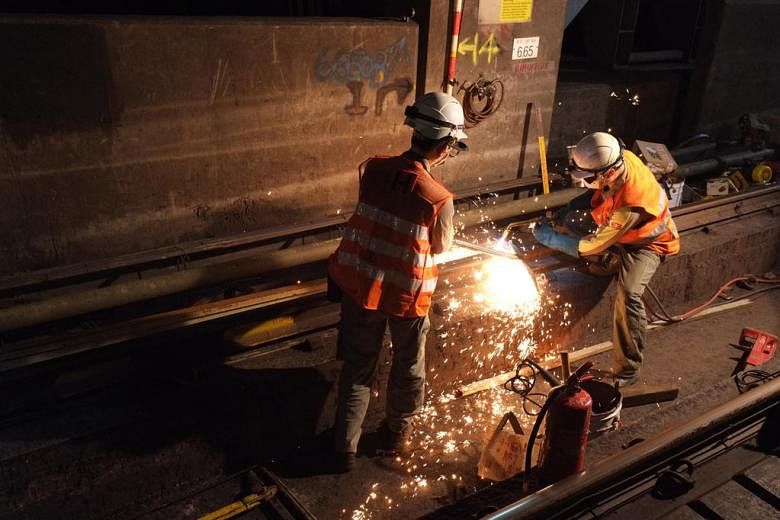The revelation that three-quarters of China-made trains for Singapore have cracks is setting off alarm bells in Hong Kong, which placed a huge order last year with the same manufacturer, CSR Qingdao Sifang.
The Singapore experience could lead to delays in Hong Kong's MTR Corporation (MTRC) accepting the 93 trains it ordered, as it asks for more information and extra checks.
The trains are due to be delivered between 2018 and 2023.
"Hong Kongers will definitely pressurise MTRC and the Transport and Health Bureau to confirm the quality of the train cars," veteran transport expert Hung Wing Tat of the Hong Kong Polytechnic University told The Straits Times.
"Some may even ask MTRC to cancel the order."
The city's Transport Secretary Anthony Cheung said yesterday that he has directed both MTRC and the various authorities to get more information. He said: "Given what we know now about the Singapore situation, we have to find out more about what's happening."
MTRC, which is publicly listed and has the government as its major shareholder, did not respond to queries on whether it is reviewing its HK$6 billion purchase.
But it said it will seek "further information" from CSR Qingdao Sifang on the faults in Singapore's trains, which were manufactured under a joint venture with Japan's Kawasaki Heavy Industries.
For now, the city is planning additional safety checks in the wake of an article published on Tuesday by Hong Kong news portal FactWire. The article detailed how Singapore's SMRT sent trains back to China for repairs last month, after discovering cracks in the structure between the car body and the undercarriage. Of the 35 trains ordered, 26 were affected, Singapore's Transport Ministry later confirmed.
MTRC said it will appoint independent safety audit experts and conduct an independent analysis of the metals used in the trains. These are on top of existing safeguards - its own staff are stationed at the factory in Qingdao to monitor the manufacturing and assembly processes.
"We fully understand public concern on the need to ensure the quality of trains," said MTRC.
It also stressed that the trains it ordered are made with stainless steel rather than aluminium alloy, which was used in the Singapore trains. Stainless steel is generally viewed as a stronger material, although it is heavier and more expensive.
Besides the 93 eight-car subway trains, CSR Qingdao Sifang is also manufacturing another nine high- speed trains for Hong Kong.
The assurances are not likely to soothe fears in the city, which is already facing opposition to having a mainland company manufacture its trains. These will replace all its first-generation British-made ones.
Even as Chinese train manufacturers increase their footprint across the globe, concerns have been raised over safety standards. For instance, Chinese-made trains in New Zealand and Australia have been found to be contaminated with asbestos, despite strict instructions not to use the cancer-causing minerals.
But China's trains are far cheaper. The ones for Hong Kong cost HK$8 million (S$1.4 million) per car, while Kawasaki's trains being manufactured for the Washington Metro cost US$2.8 million per car (S$3.8 million).
MTRC said CSR Qingdao Sifang won the bid after a "rigorous and competitive" tender process.

